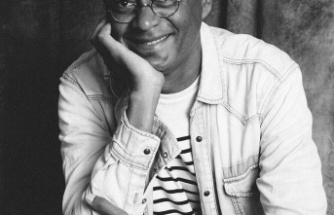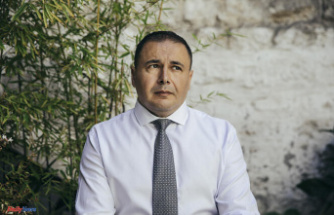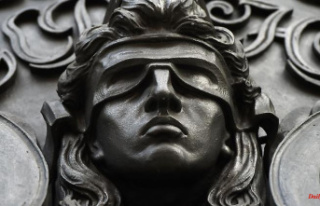In principle, mountains are pretty idyllic. If you are not directly in front of them, if you really want to go up and the massif in question is not exactly high in the Himalayas. For example, if you stand in front of the Tyrolean Passion Play Theater in Erl and look across the Inn towards Bayreuth, i.e. to the north, a plain opens up between two mountain ranges of medium height standing there like sentinels, over which the sky likes to shine during breaks or at the end of an evening at the Tyrolean Festival lets at least the premonition of a twilight of the gods shine through. This looks very nice overall.
Erl, which is less than an hour away from Munich via the Autobahn towards Innsbruck, is less than an hour away from Munich when the traffic conditions are reasonably smooth and there is no vignette obligation. As a Wagner festival for home sleepers, so to speak. A “Ring” – staged by the legendary mezzo-soprano Brigitte Fassbaender – is currently being forged in the ultra-chic new Festspielhaus.
The ascent of the complete works of the Master of the Green Hill, who probably spent less than five minutes at the foot of the Wilder Kaiser in his life, has now largely been completed. With an unsweaty lightness that one would have heartily wished for some of Wagner's immediate descendants when they tried to step out of his shadow, which was far across the Himalayas.
Which brings us finally to Ernest Chausson, because of whom one should actually – let’s say it straight away – drop everything and go to Erl as long as his only opera “Le Roi Arthus” is still being played. The story of this monumental three-act play is the story of an ant at the foot of a mountain massif. That's how Chausson, the tall, scrupulous self-doubter, felt while writing to him for a good dozen years, trying to find via ferratas through the "Tristan" massif, his own language, his own sound, trying to de-Wagnerize himself .
Perhaps we should first explain Ernest Chausson. If there had already been braking systems on bicycles in Chausson's day, the catastrophe would not have happened on June 10, 1899 at the end of the small hill of Linay, 60 kilometers north-east of Paris on the banks of the Seine. And music history might have taken the path into an interesting side valley. The summer visitor Chausson wanted to pick up his wife and five children from the train station, got on the bike, there were no helmets either, came to the hill, lost control, crashed into a wall and died at the scene of the accident.
Chausson was 44 years old, with a wild beard and thinning hair. He had to study law, his parents wanted it that way. He had a doctorate and worked as a notary. He could have become a writer, a painter. he became a musician. Pupil of Massenet at the Conservatoire, which he left without a degree after a dispute. He became a private student of César Franck.
Secretary to Camille Saint-Säens' "Société Nationale de la Musique". Networker between the arts. patron too. Best pal and page turner by Claude Debussy. Wagnerians – like all French, of course, despite the defeat of 1870/71. Wanderer through Bavaria, admirer of Bayreuth, assistant at the premiere of Parsifal in Munich.
He wrote songs, chamber music, symphonies. It was later described as a hyphen between Franck and Debussy, which was quite cheeky, as a forgotten link between romanticism and symbolism. A heartbreaking melancholy wafts through his Trios, his addictive Concerto for Violin and Piano Quartet. Chausson, friend of Mallarmé and Fantin-Latour, art collector and conversation starter, provides the soundscape of the sleepwalkers, the salons in which Marcel Proust grew up.
"I was sad," the great melancholic once wrote, "without really knowing why, but firmly convinced that I had every right in the world to do it." Chausson, who, like all autodidacts who suspected themselves of being amateurs, could hardly let go, is Belle Epoque. Carries romance towards the future via a sensually flashing sound surface.
Of course, he also wanted to write opera, get out of the salons, conquer the Wagner chain. He had a dozen templates in mind. Literary heavyweights. It is worthy of all honor that he took on the highest peak in music history first. For music history, however, it was just as gratifying as it was tragic. Chretien de Troyes' Arthurian legend. A legend of almost dizzying Tristan fall height.
The story of the noble king who is betrayed by his wife Genièvre and his best knight Lancelot. Not really manageable without rope and oxygen equipment. Chausson was thirty when he began his libretto in 1885, and Wagner had been dead for just two years. Ten years later he was done with everything. Debussy - whose similarly perpetually reworked five-act Pelléas et Mélisande is, of course, also a "Tristan" ascent by a different, but now definitively Symbolist, route - was enraptured by what friend Chausson was showing him. Chausson did not live to see the premiere in Brussels in 1903, which was a triumph a year after Debussy's “Pelléas” in Paris. “Arthus” stayed on the Brussels repertoire for an amazingly long time.
There have been a few attempts to pull this supposedly eclectic, supposedly chivalrous extravaganza off the middle shelves of faded masterpieces. There was a model performance in Bregenz. Another one in Brussels. And every time it was amazed that Chausson had not only managed to successfully cross "Tristan", but also, so to speak, a hut tour through the high mountains of late romantic music theater.
"Le Roi Arthus" is not just a de-Wagnerization, it is the invention of a tangible symbolism, a French reinvention of the dawning verismo. Is something musically rare in the Belle Epoque, realism and fantasy in one, sonic stall magic and highly individual melody swing, medieval warrior bickering and timeless political debate about idealism and ideology.
It doesn't actually take much, to be precise you have to go to Erl, to bring Arthus fairly close to us. A band of wild creatures who might just have been of service to "Vikings" cheer the king, who has just driven the barbarian Saxons out of the country. Anyone who has survived a few minutes of Game of Thrones will immediately feel at home in Erl's version of Westeros. The stage is sparse, a metal ring like Wieland Wagner used to do in Bayreuth stands for a round table and an abyss, a fire will blaze around it at the end, dead ravens planted on lances around it. The sea is chased over the gray walls by video, mythical apple trees grow, birds fly up.
Arthus thinks he has reached the goal of his ideal. Chivalry, manliness, civilization have triumphed. He thinks. Doesn't see what the director Rodula Gaitanou makes visible in the first gestures, the first glances. Everything falls apart. Mordred, the sinister nephew, strives for Arthur's throne, Lancelot, the beloved knight, arranges to meet, the jubilation is still in full swing, for a night together with the king's wife. Genièvre is one of the great love radicals in opera history, she drives – red-haired, long-maned, closer to Lady Macbeth than Isolde or the golden-maned Mélisande – to Lancelot, who is fickle between love for the king and love for the woman.
There are three great duets in the three acts. One is grander than the other. Anna Gabler's Genièvre would probably make every “Tristan” and “Pelléas” have a different ending in their duet, Aaron Cowley's Lancelot brings the not easy trick of the portrait of a strangely soft-headed warrior over the ramp in an amazingly heroic way.
Nevertheless, Chausson's opera is called "Le Roi Arthus" with the same justification as Wagner's and Debussy's sibling thematic works are named after the illegal lovers, and not "Marke" or "Golaud". Chausson's three-and-a-half hour is of course a love story, but it's more like the developmental novel of a powerful man who, through the decay of everything he believed in, what he declared his raison d'etat, to find himself and a kind of zen-like serenity.
In their earthly urges, the lovers have sung themselves to death from the moral prison of their lives on its rods and are dead, as is customary in operatic acts. However, Chausson lets Arthur, the pure one, his philosophical alter ego, ascend into a better world. Those of legends, of eternal sagas.
That can go quite wrong, not just the apotheosis, a kind of earthly twilight of the gods at the end. Nothing goes wrong in Erl. Which was not only due to the balsamic baritone of 33-year-old Domen Krizaj, who was laboriously transformed into a mottled gray sage. But above all because of the passion in the Passionsspielhaus, with which the Erler team heaves this heavyweight onto the difficult stage. From the moment when Karsten Januschke lets his "Arthus" break loose with the large orchestra in the background (there is no orchestra pit in the Passionsspielhaus) like a knight film in Cinemascope, there is not a second in which one asks oneself why this one of all things piece had to be cleared of dust.
It sparkles and jingles and clatters, it shines in all the colors that a monumental late-Romantic sound body can produce, the bass clarinets and English horns let off steam. Januschke savors every Tristanerei, every "Ring" forging and yet emphasizes the independence of Chausson's changeling in every bar.
At the end you stand there, looking into the distance between the two mountains to the north and to Bayreuth, sweating like you did after a "Tristan" on the Green Hill and your back hurts just as much. You're a little happier, though.












